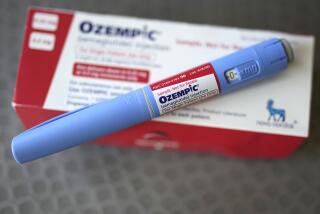Take the Slow Approach to Dieting : Consumers: New Federal Trade Commission official targets rapid weight-loss schemes for investigation.
- Share via
WASHINGTON — Barry Cutler lost a pound a week in 1987, even while eating a substantial 2,200 calories a day (breakfast: a whole grapefruit, bagel with cream cheese, juice). So far, he says, a bagel a day has kept the doctor away; he’s kept off all 50 pounds.
But when he told his friends about his weight-loss regime, which was supervised by C. Wayne Callaway, a Washington endocrinologist and clinical nutritionist, they told him they couldn’t stand losing weight at such a snail’s pace. Even when he told his friends to talk to Callaway, or to a nutritionist, or psychiatrist, who in turn told them that quick weight-reduction programs are destined to fail, they wouldn’t listen.
Consumer education has become key to Cutler’s mission, both personally and professionally. Cutler is the new director of the Federal Trade Commission’s Bureau of Consumer Protection.
And Cutler and FTC chairwoman Janet Steiger recently told a congressional subcommittee that the agency is enlarging its efforts to examine advertising claims made by major diet-clinic chains and hospital- and physician-based weight-loss programs.
The FTC, which during the 1980s was close to dormant when it came to scrutinizing the major players in the $33-billion weight-loss market, also will encourage more state actions in cracking down on fraudulent diet claims.
Rep. Ron Wyden (D-Ore.) chairman of the House Subcommittee on Regulation, Business Opportunities and Energy, said that although the FTC has brought a handful of actions against the most obvious gadgets and gimmicks (Gut Buster and Fat Magnet, to name two), no FTC cases to date have “tackled the potentially greater threats, the fastest growing trends toward commercial weight-loss clinics and physician-supervised diet programs.”
Cutler said that while FTC has in the past focused on the most blatant “rip-offs,” its new task will be far more difficult. Mainstream advertisements are much more sophisticated and pitch programs that involve differences in medical opinion, he said.
In addition, said Cutler, FTC is able to act only on fraudulent advertisements and is not able to evaluate the efficacy of products or the qualifications of physicians; those areas are the responsibilities of the Food and Drug Administration and state medical boards.
Cutler said he is interested in looking at whether in order to attract customers and remain successful, national programs must sell their products in a way that actually increases the chances of failure--by promising rapid weight loss. “People may not be willing without more education to lose weight the way the experts tell them they have to,” he said.
Wyden said he is particularly concerned about the zealous marketing of liquid-formula diets to physicians who may not be well versed in nutrition and obesity. Many of these programs are also very low in calories, which can be dangerous if not supervised correctly, he said.
A commentary in an issue of the Journal of the American Medical Assn. expressed concern over the use of very-low-calorie diets for people who are not severely overweight. “Moreover, the prescription of these diets by physicians untrained in their use is cause for anxiety,” wrote the authors.
A study by MarketData Enterprises showed that hospital-physician-sponsored weight-loss programs are growing by 15% yearly, constituting a $5.5-billion market.
Another big chunk of this market is composed of large commercial diet centers, whose revenues per center average from $600,000 to $2 million. One of these is Nutri-System, which recently was sued by 19 Florida women who are alleging gallbladder damage from the diet.
To protect yourself, here are some tips to keep in mind when evaluating the promises of weight-loss programs. The National Council Against Health Fraud disparages commercial weight-loss programs that:
-- Promise or imply dramatic, rapid weight loss.
-- Promote diets that are extremely low in calories (below 800 calories per day; 1,200-calorie diets are preferred) unless under the supervision of competent medical experts.
-- Attempt to make clients dependent upon special products rather than teaching how to make good choices from the conventional food supply.
-- Do not encourage permanent, realistic lifestyle changes including regular exercise and altering behavior that uses food as a coping device. (Programs should focus upon changing the causes of overweight rather than simply the effects, which is the overweight itself.)
-- Misrepresent salespeople as “counselors” supposedly qualified to give guidance in nutrition and-or general health. Even if adequately trained, such “counselors” would still be objectionable because of the obvious conflict-of-interest that exists when providers profit directly from products they recommend and sell.
-- Require large sums of money at the start or require that clients sign contracts for expensive, long-term programs. Such practices too often have been abused as salespeople focus attention upon signing up new people rather than delivering continuing, satisfactory service to consumers. Programs should be on a pay-as-you-go basis.
-- Fail to inform clients about the risks associated with weight loss in general, or the specific program being promoted.
-- Promote unproven or spurious weight-loss aids such as human chorionic gonadotrophin hormone (HCG), starch blockers, diuretics, sauna belts, body wraps, passive exercise, ear stapling, acupuncture, electric muscle stimulating (EMS) devices, spirulina, amino-acid supplements and so forth.
-- Claim that use of an appetite suppressant or methylcellulose (a bulking agent) enables a person to lose body fat without restricting accustomed caloric intake.


